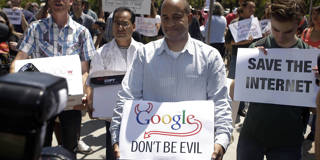As in the days of the robber barons, "villainous" business behavior has once again become a cultural touchstone in the United States. But while it is tempting to focus on individual personalities, the bigger problem is an institutional environment that no longer holds bad actors accountable.
BOSTON – Are successful businesspeople more like heroes or villains? In fictional accounts, one can find plenty of examples of each, from Charles Dickens’s miserly Ebenezer Scrooge to Ayn Rand’s rugged individualist entrepreneur John Galt. In F. Scott Fitzgerald’s The Great Gatsby, Tom Buchanan represents privileged old money, with its ruthlessness and incapacity for empathy, whereas Jay Gatsby is a self-made millionaire with no shortage of sentimentality and idealism.
One finds the same distinctions in social-science depictions of entrepreneurs. Joseph Schumpeter and his followers viewed entrepreneurs as the engines of growth, the heroic figures who delivered “gales of creative destruction.” By contrast, Frederick Engels’s The Condition of the Working Class in England heaped scorn on British industrialists who pushed their workers not just into poverty but into inhumane working and living conditions. But later, he and Karl Marx made the two roles an essential part of their theory of capitalism: ruthless businesspeople exploit workers but also unleash innovation and growth, ultimately transforming society.
These conflicting depictions reflect society’s complex views of business. Obviously, it would be naive to expect all businesspeople to be either heroes or villains. Like most of us, they are often both.

BOSTON – Are successful businesspeople more like heroes or villains? In fictional accounts, one can find plenty of examples of each, from Charles Dickens’s miserly Ebenezer Scrooge to Ayn Rand’s rugged individualist entrepreneur John Galt. In F. Scott Fitzgerald’s The Great Gatsby, Tom Buchanan represents privileged old money, with its ruthlessness and incapacity for empathy, whereas Jay Gatsby is a self-made millionaire with no shortage of sentimentality and idealism.
One finds the same distinctions in social-science depictions of entrepreneurs. Joseph Schumpeter and his followers viewed entrepreneurs as the engines of growth, the heroic figures who delivered “gales of creative destruction.” By contrast, Frederick Engels’s The Condition of the Working Class in England heaped scorn on British industrialists who pushed their workers not just into poverty but into inhumane working and living conditions. But later, he and Karl Marx made the two roles an essential part of their theory of capitalism: ruthless businesspeople exploit workers but also unleash innovation and growth, ultimately transforming society.
These conflicting depictions reflect society’s complex views of business. Obviously, it would be naive to expect all businesspeople to be either heroes or villains. Like most of us, they are often both.